| Listing 1 - 10 of 19 | << page >> |
Sort by
|
Book
ISBN: 3503030077 Year: 1992 Volume: 11 Publisher: Berlin Schmidt
Abstract | Keywords | Export | Availability | Bookmark
 Loading...
Loading...Choose an application
- Reference Manager
- EndNote
- RefWorks (Direct export to RefWorks)
Poetry --- German literature --- anno 1200-1499 --- Christian poetry, German --- German poetry --- Poésie chrétienne allemande --- Poésie allemande --- Bibliography --- Bibliographie --- Poésie chrétienne allemande --- Poésie allemande --- Religious poetry [German ] --- Middle High German, 1050-1500 --- Civilization, Medieval, in literature --- Bibliography.
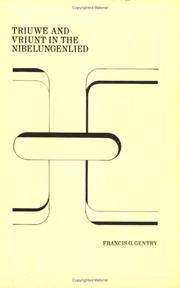
ISBN: 9062033687 9789062033683 Year: 1975 Publisher: Amsterdam : Rodopi,
Abstract | Keywords | Export | Availability | Bookmark
 Loading...
Loading...Choose an application
- Reference Manager
- EndNote
- RefWorks (Direct export to RefWorks)
Loyalty in literature. --- Friendship in literature. --- Nibelungen in literature. --- Epic poetry, German --- Epic poetry, German. --- History and criticism. --- Nibelungenlied. --- Nibelungenlied
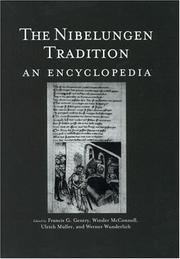
ISBN: 0815317859 041576369X 0429236115 0203820436 1136750207 129928762X 1136750193 9780203820438 9780815317852 9780429236112 Year: 2002 Publisher: New York (N.Y.): Routledge
Abstract | Keywords | Export | Availability | Bookmark
 Loading...
Loading...Choose an application
- Reference Manager
- EndNote
- RefWorks (Direct export to RefWorks)
Within the English-speaking world, no work of the German High Middle Ages is better known than the Nibelungenlied, which has stirred the imagination of artists and readers far beyond its land of origin. Its international influence extends from literature to music, art, film, politics and propaganda, psychology, archeology, and military history.Now for the first time all references to the vast Nibelungen tradition have been catalogued in this comprehensive encyclopedia containing nearly 1000 entries by several dozen international contributors, including the most distinguished s
091 =30 --- Handschriftenkunde. Handschriftencatalogi--Duits --- 091 =30 Handschriftenkunde. Handschriftencatalogi--Duits --- Nibelungen --- Nibelungenlied --- Nibelungensage --- Nibelungs --- Legends --- Nibelunge Nôt --- Nibelunge Liet
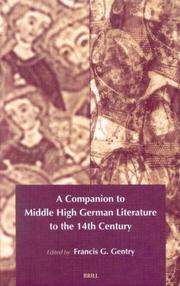
ISBN: 1280464704 9786610464708 1417510552 9047400879 9781417510559 9789047400875 9789004120945 9004120947 9781280464706 Year: 2002 Publisher: Leiden Boston Brill
Abstract | Keywords | Export | Availability | Bookmark
 Loading...
Loading...Choose an application
- Reference Manager
- EndNote
- RefWorks (Direct export to RefWorks)
A guide to mediaeval German literature from its beginnings in the eighth century to the 14th century. Chapters deal either with a chronological period, such as the 13th century, or with specific genres, such as drama. The development of the German language in the mediaeval period is also covered.
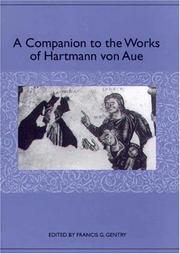
ISBN: 1571132384 157113641X Year: 2005 Publisher: Rochester, NY : Camden House,
Abstract | Keywords | Export | Availability | Bookmark
 Loading...
Loading...Choose an application
- Reference Manager
- EndNote
- RefWorks (Direct export to RefWorks)
In perhaps 25 years of creative productivity (ca. 1180-ca. 1205), Hartmann von Aue authored a dispute about love between the body and the heart, Die Klage, numerous songs of courtly love, crusading songs, and most likely took part in a Crusade himself. He composed the first German Arthurian romance, Erec, based on Chrétien's like-named work, and he -- apparently -- ended his literarycareer with a second, Iwein. Further, he is the creator of two provocative rel-igious-didactic works, Gregorius, a tale of double incest, repentance, and redemption, and Der arme Heinrich, the account of a seemingly perfect nobleman who is stricken with leprosy and then ultimately cured by a process set into motion by a very young peasant girl, whom he ultimately marries. Noother medieval German poet treats such an extraordinary breadth of themes at such a high level of artistic expression. The essays in this volume, written by scholars from North America and Europe, offer insight into many aspects of Hartmann's oeuvre, including the medieval and modern visual and literary reception of his works. The volume also offers considerations of Hartmann and Chrétien;Hartmann's putative theological background and the influence of the Bible on his tales; the reflection of his medical knowledge in Der arme Heinrich and Iwein; and a complete survey of his lyric production. Newer avenues of research are also presented, with essays on issues of gender and on the role of pain as a constitutive part of the courtly experience. It is hoped that this volume will prove to be a stimulating companion not only for those familiar with Hartmann but also for those who are just making the acquaintance of one of the greatest of medieval German poets.
Francis G. Gentry is Professor Emeritus of German at the Pennsylvania State University and the University of Wisconsin-Madison.
Hartmann, --- Criticism and interpretation. --- Aue, Hartmann von, --- Hartman, --- Hartmann von Aue, --- Hartman von Owe --- LITERARY CRITICISM / European / General. --- Arthurian romance. --- Der arme Heinrich. --- Die Klage. --- Gregorius. --- Hartmann von Aue. --- body. --- courtly experience. --- courtly love. --- crusading songs. --- double incest. --- gender. --- heart. --- leprosy. --- love. --- medieval German poet. --- nobleman. --- pain. --- redemption. --- repentance.

ISBN: 9781571136411 9781571132383 Year: 2005 Publisher: Rochester, NY Camden House
Abstract | Keywords | Export | Availability | Bookmark
 Loading...
Loading...Choose an application
- Reference Manager
- EndNote
- RefWorks (Direct export to RefWorks)
Book
Year: 1975 Publisher: Amsterdam Rodopi
Abstract | Keywords | Export | Availability | Bookmark
 Loading...
Loading...Choose an application
- Reference Manager
- EndNote
- RefWorks (Direct export to RefWorks)
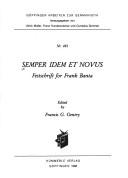
ISBN: 3874527174 Year: 1988 Publisher: Göppingen Kümmerle
Abstract | Keywords | Export | Availability | Bookmark
 Loading...
Loading...Choose an application
- Reference Manager
- EndNote
- RefWorks (Direct export to RefWorks)
Periodical
Year: 2003 Publisher: New York London Routledge
Abstract | Keywords | Export | Availability | Bookmark
 Loading...
Loading...Choose an application
- Reference Manager
- EndNote
- RefWorks (Direct export to RefWorks)
Book
ISBN: 9004648542 Year: 1975 Publisher: Leiden : BRILL,
Abstract | Keywords | Export | Availability | Bookmark
 Loading...
Loading...Choose an application
- Reference Manager
- EndNote
- RefWorks (Direct export to RefWorks)
Friendship in literature. --- Epic poetry, German --- History and criticism.
| Listing 1 - 10 of 19 | << page >> |
Sort by
|

 Search
Search Feedback
Feedback About UniCat
About UniCat  Help
Help News
News